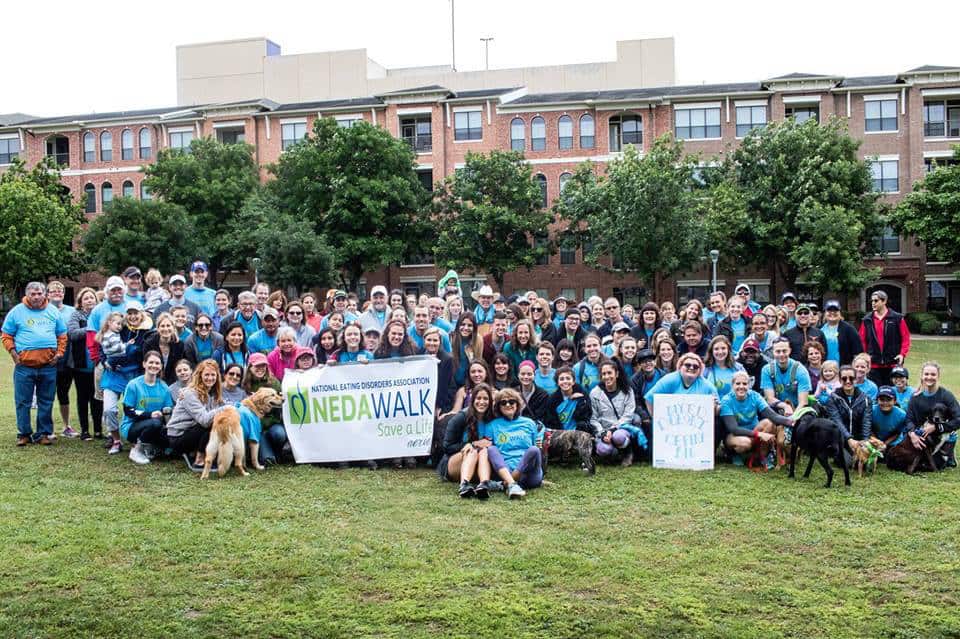Social work student organizes awareness walk to unite communities in recovery
When Niki DuBois was struggling to recover from an eating disorder, she would try on half of her wardrobe before ultimately deciding she couldn’t leave the house. She said her friends who didn’t suffer from body image issues just didn’t get it. They couldn’t understand either why it was such a big deal when she conquered eating a “fear food” like pasta.
“But if I called one of my other friends also in recovery, they immediately understood and I didn’t even have to explain myself,” she said.

As the organizer of this year’s Austin’s National Eating Disorders Association (NEDA) walk, DuBois aims to create a community for those with similar stories. Since last December, she has met with various organizations and treatment centers to solicit sponsorship and donations for the walk.
While NEDA has the overarching goal of raising awareness about eating disorders, DuBois has also incorporated her own goals into this year’s walk. A master’s student in the Steve Hicks School of Social Work, DuBois has also recovered from substance abuse and hopes the walk can unite people who have experienced either struggle or both.
“I just want to help people that are either seeking recovery or are in strong recovery build community out of that ability to relate to one another,” she said. “Since I’m a member of both communities, I’m able to go back and forth between them and try to build a bridge.”
According to DuBois, the eating disorder community can learn from the substance abuse community. She said the latter tends to be more tightly knit because members are encouraged to live in halfway homes and to keep in contact with each other after treatment — unlike individuals recovering from eating disorders.
She said professionals working in eating disorders recovery fear that one faltering roommate could trigger a chain reaction of relapses in others. But DuBois disagrees with this line of thinking. For her, living in a halfway home for substance abuse was valuable to her recovery.
“It has been my personal experience that the people who are able to support me and understand me the most are the ones that have also gone through the same thing,” DuBois said. “People did relapse and maybe sometimes another person would be affected by that, but not everyone. Instead, we usually rallied together.”
DuBois has recruited two major treatment centers — one for substance abuse and one for eating disorders — to sponsor the NEDA walk. Her intention is to have substance abuse treatment centers visible and available at the walk to reach out to people recovering from eating disorders who may still be struggling with substance abuse. DuBois said that although research supports that people with eating disorders are at much higher risk of abusing substances, to her knowledge the connection between the two is not talked about enough in treatment facilities.
“From talking to directors at different treatment centers for substance abuse, there is a little bit more education around eating disorders and nutrition but there is no one specifically on staff who is educated around eating disorders, and there are no groups there specifically for eating disorders,” DuBois said.
She added that while eating-disorder treatment facilities might acknowledge or mention substance abuse to patients during the recovery process, patients still have opportunities to abuse substances after-hours if they have evenings off to themselves.
“As someone who struggled with both disorders, I went so many years switching from one struggle to the other because there wasn’t a facility that will help me deal with both,” she said.
She hopes to one day create a treatment center that effectively addresses both struggles at the same time because it is costly and time-prohibitive for people to go “from one treatment center to the next.”
“If I could prevent somebody else from going through 12 years struggling with substance abuse and an eating disorder, I would love to be able to do that,” she said. “I would love to treat both. But for now my goal is to work at an eating disorder treatment facility and once I get some experience around that, maybe I’ll be able to implement more effective ways to treat substance abuse there.”
Her experience organizing the NEDA campaign has reinforced her commitment to serving these populations. The experience has also encouraged her to consider switching from her current Clinical concentration in the master of social work program into the Administration and Policy Practice concentration. Her long term goal is to become a clinical director of an eating disorder treatment center.
For now, she’s focused on raising more money and recruiting more sponsors for the walk.
“I’m trying to make it a community event because recovery for eating disorders takes a village,” DuBois said. She added that a person in recovery will usually need a dietitian, a therapist, and support from family and friends.
“But what if you don’t have those supports? Who do you turn to?” DuBois said. “The goal of this walk is to bring people together so that they can turn to each other.”
* * * *
The NEDA Walk will take place April 21, 2018 from 9 a.m. to noon at Auditorium Shores. Find out more and donate here. Join or donate to the Steve Hicks School of Social Work team here.
By Lynda Gonzalez. Posted April 12, 2018.


